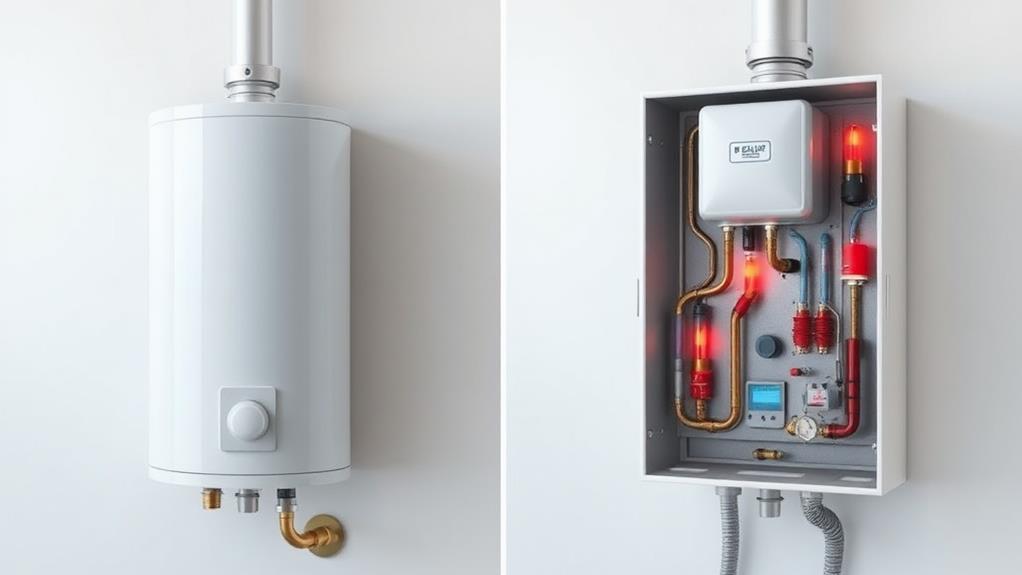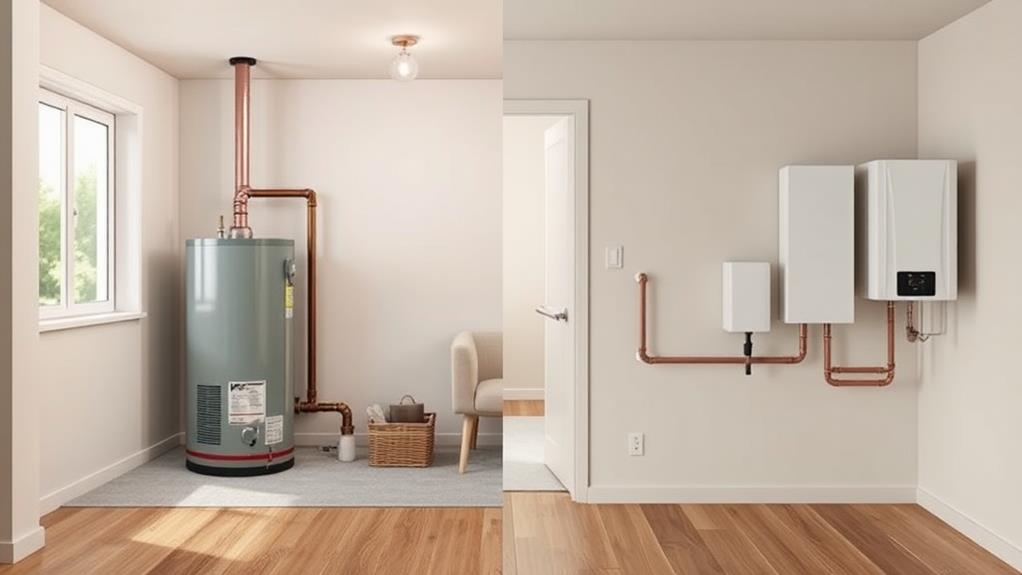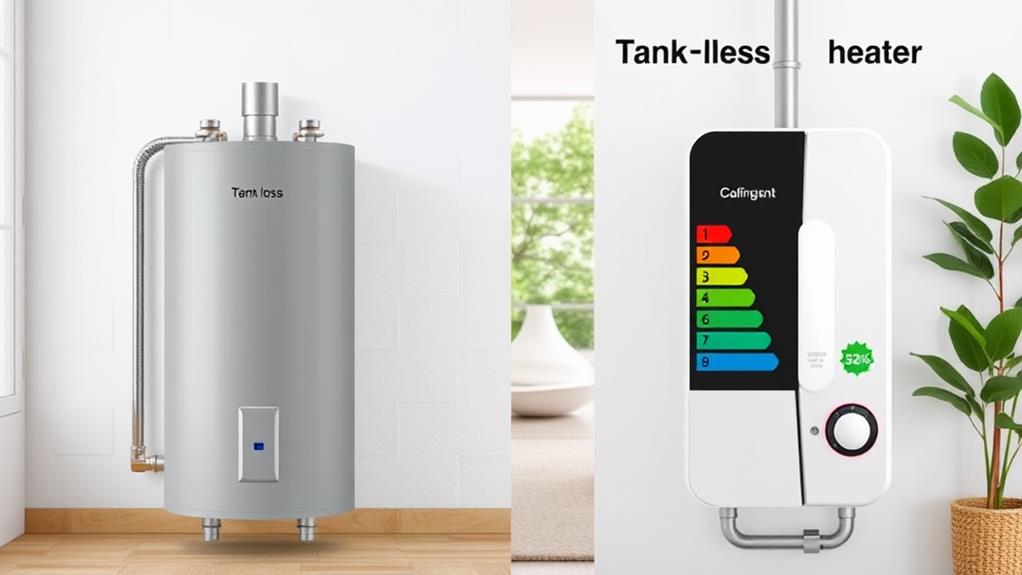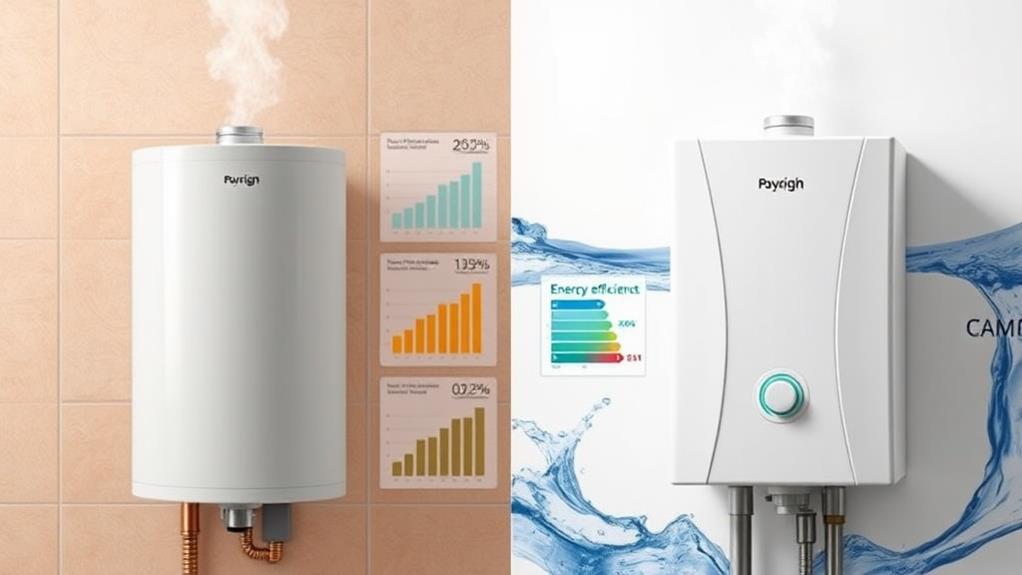When comparing tank and tankless water heaters, efficiency is a key factor. Tank heaters store and continuously heat water, ensuring it's always ready but potentially wasting energy. Tankless systems heat water on demand, eliminating standby losses. Tankless heaters boast higher energy factors (0.82-0.98) compared to tank models (0.5-0.7), potentially using 30% less energy annually. While tankless units have higher upfront costs, they can lead to long-term savings on energy bills and last longer. They're also more compact, offering flexible installation options. However, tank heaters are typically easier to install. Your choice will depend on various factors beyond just efficiency.
Operating Principles

Homeowners often face a choice between two distinct water heating systems: tank and tankless. Understanding how each operates is crucial for making an informed decision.
Tank water heaters store and continuously heat a large volume of water, typically 40-80 gallons. They're always on, maintaining the water at a preset temperature. When you turn on a hot water tap, the heater draws preheated water from the top of the tank and refills with cold water at the bottom. This system ensures you've got hot water ready whenever you need it, but it can waste energy heating water you're not using.
Tankless water heaters, also called on-demand heaters, work differently. They heat water only when you need it. When you turn on a hot water tap, cold water flows through a heat exchanger in the unit. A sensor detects the water flow and activates a gas burner or electric element to heat the water instantly. You'll get a continuous supply of hot water, but the flow rate might be limited compared to tank systems. Tankless heaters don't waste energy keeping a large tank of water hot, potentially offering significant energy savings.
Energy Efficiency Comparison
When comparing the energy efficiency of tank and tankless water heaters, it's essential to consider both standby and operational losses. Tank water heaters constantly maintain a large volume of hot water, resulting in standby heat loss as the water cools over time. This requires frequent reheating, even when you're not using hot water.
Tankless heaters, on the other hand, only heat water on demand, eliminating standby losses.
Operational efficiency also differs between the two types. Tank heaters typically have an energy factor (EF) ranging from 0.5 to 0.7, while tankless models can achieve EFs of 0.82 to 0.98. This means tankless heaters convert more of their energy input into usable hot water. However, you should note that tankless heaters may struggle to meet high simultaneous hot water demands, potentially reducing their real-world efficiency.
In terms of annual energy consumption, you can expect tankless heaters to use about 30% less energy than their tank counterparts. This translates to lower utility bills and reduced environmental impact. Despite their higher upfront costs, tankless heaters' superior efficiency often leads to long-term savings, making them an attractive option for energy-conscious homeowners.
Installation and Space Requirements

Installing a water heater involves considering both the complexity of the process and the space required for the unit. For tank water heaters, you'll need a dedicated space, typically in a basement, garage, or utility closet. These units are generally easier to install, especially when replacing an existing tank heater. You'll need to ensure proper ventilation and access for maintenance.
Tankless water heaters, on the other hand, offer more flexibility in installation locations due to their compact size. You can mount them on walls, saving valuable floor space. However, the installation process is often more complex and may require upgrades to your home's electrical or gas systems. You might need to install new venting or make plumbing modifications to accommodate the tankless unit.
When considering space requirements, tank heaters typically occupy 10-15 square feet of floor space, while tankless units can be as small as 2-3 square feet. If you're tight on space, a tankless heater might be the better option. But remember, you'll need to factor in the potential additional costs and complexity of installation when making your decision.
Cost Analysis
In light of the long-term financial implications, a thorough cost analysis is crucial when deciding between tank and tankless water heaters. Initially, you'll find that tankless models have a higher upfront cost, often ranging from $500 to $2,000, compared to traditional tank heaters, which typically cost between $300 and $1,000.
However, the cost analysis doesn't end with the purchase price. You'll need to factor in installation costs, which are generally higher for tankless systems due to their complexity. Operating costs also differ significantly. Tankless heaters are more energy-efficient, potentially saving you 10-50% on your water heating bills. Over time, these savings can offset the higher initial investment.
Lifespan is another crucial consideration. Tankless units often last 20 years or more, while tank heaters typically need replacement after 10-15 years. This longevity can translate to significant long-term savings. Don't forget to account for maintenance costs; tankless systems may require more frequent servicing to prevent mineral buildup.
Lastly, consider potential energy rebates or tax incentives for installing energy-efficient tankless systems, which can further reduce your overall costs.
Environmental Impact

Assessing the environmental impact of water heaters reveals significant differences between tank and tankless models. When comparing their carbon footprint, tankless heaters generally come out ahead. They're more energy-efficient, using less electricity or gas to heat water on demand, which translates to lower greenhouse gas emissions over time.
Tank heaters, while improving in efficiency, still consume more energy due to standby heat loss. They're constantly keeping a large volume of water hot, even when you're not using it. This continuous energy use contributes to higher emissions and resource consumption.
Tankless heaters also typically have a longer lifespan, reducing the frequency of replacement and associated manufacturing impacts. However, it's worth noting that the production of tankless units can be more resource-intensive initially.
When considering water conservation, tankless models can encourage more mindful usage. You're less likely to waste hot water waiting for it to heat up, potentially reducing overall water consumption. Tank heaters, conversely, provide a larger volume of hot water, which might lead to more prolonged use.
Ultimately, tankless water heaters generally offer a more environmentally friendly option, but your specific usage patterns and energy source will influence the overall impact.
Performance and Reliability
Performance and reliability are crucial factors when choosing between tank and tankless water heaters. Tank heaters provide a consistent supply of hot water, but they can run out during peak usage. You'll need to wait for the tank to refill and reheat, which can be inconvenient.
Tankless heaters, on the other hand, provide hot water on demand without running out. However, they may struggle to keep up with multiple simultaneous hot water demands.
Tank heaters typically last 10-15 years, while tankless units can last up to 20 years with proper maintenance. Tankless heaters are more complex and may require professional servicing, but they're less prone to leaks and flooding. Tank heaters are simpler but can develop leaks over time, potentially causing water damage.
In terms of performance, tankless heaters offer more consistent water temperatures but may have a slight delay when turning on the hot water. Tank heaters deliver hot water immediately but may fluctuate in temperature as the tank empties and refills. Consider your household's hot water needs and usage patterns when deciding which type best suits your requirements.
Conclusion
You've now explored the tank vs. tankless water heater debate, weighing efficiency like a master scientist. While tankless units shine in energy savings and longevity, traditional tanks win on upfront costs. Your choice depends on your home's needs and budget. Remember, the right water heater can make your showers feel like you're bathing in liquid gold. Whichever you choose, you're taking a step towards a more efficient and comfortable home.

